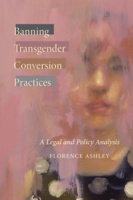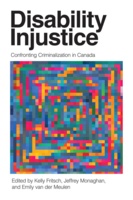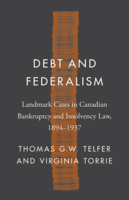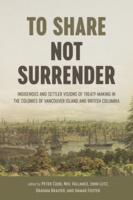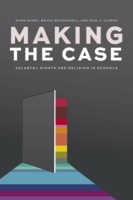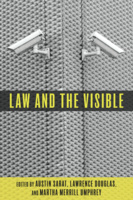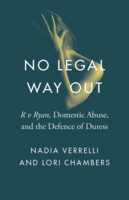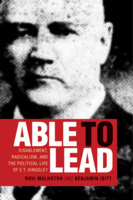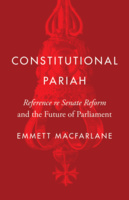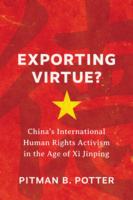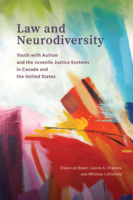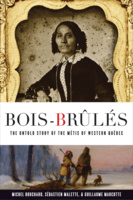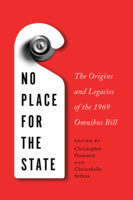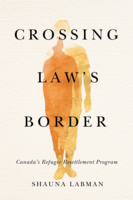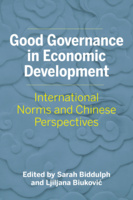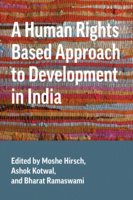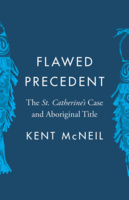Constitutionalizing Criminal Law
Constitutionalizing Criminal Law explains why the Supreme Court of Canada’s jurisprudence considering the constitutionality of criminal laws fails to strike a principled balance between the need to increase the coherency of the criminal law while maintaining the legitimacy of judicial review.
Banning Transgender Conversion Practices
A Legal and Policy Analysis
Banning Transgender Conversion Practices is the first book to offer a comprehensive analysis of how conversion practices targeting transgender people are regulated around the world.
Disability Injustice
Confronting Criminalization in Canada
In Disability Injustice, scholars and activists deliver a much-needed and long overdue analysis of disability and criminalization in Canada.
Religious Diversity in Canadian Public Schools
Rethinking the Role of Law
This comprehensive analysis of the legally complex relationship between religion and public schools will compel readers to reconsider the role of law in education.
Debt and Federalism
Landmark Cases in Canadian Bankruptcy and Insolvency Law, 1894-1937
Debt and Federalism is the first complete account of the Canadian federal bankruptcy and insolvency power, showing how four landmark cases form the bedrock of the modern bankruptcy system.
Reconciling Truths
Reimagining Public Inquiries in Canada
Reconciling Truths is a forthright examination of commissions of inquiry that demonstrates the need for astute leadership and an engaging process if they are to lead to meaningful change.
Beyond Rights
The Nisg̱a’a Final Agreement and the Challenges of Modern Treaty Relationships
Beyond Rights examines the legal, political, and cultural implications of the groundbreaking process of negotiating the Nisga’a treaty.
To Share, Not Surrender
Indigenous and Settler Visions of Treaty Making in the Colonies of Vancouver Island and British Columbia
To Share, Not Surrender presents multiple views and lived experience of the treaty-making process and its repercussions in the Colonies of Vancouver Island and British Columbia, and publishes, for the first time, the Vancouver Island Treaties in First Nations languages.
Making the Case
2SLGBTQ+ Rights and Religion in Schools
Making the Case provides clear explanations of how law protects sexual minority rights, making it an essential resource for supporting 2SLGBTQ+ students in Canadian schools.
Globalization, Poverty, and Income Inequality
Insights from Indonesia
Globalization, Poverty, and Income Inequality uses diverse empirical approaches to reveal the sometimes unexpected effects of trade and globalization on poverty and inequality.
Behind Closed Doors
The Law and Politics of Cabinet Secrecy
Behind Closed Doors asks – and answers – whether the doctrine of Cabinet secrecy still has a role in the Westminster parliamentary system.
The Laws and the Land
The Settler Colonial Invasion of Kahnawà:ke in Nineteenth-Century Canada
The Laws and the Land, an original and impassioned account of the history of the relationship between Canada and Kahnawà:ke, reveals the clash of settler and Indigenous legal traditions and the imposition of settler colonial law on Indigenous peoples and land.
Assisted Suicide in Canada
Moral, Legal, and Policy Considerations
Assisted Suicide in Canada provides an accessible, up-to-date introduction to this vitally important topic of ongoing public debate.
No Legal Way Out
R v Ryan, Domestic Abuse, and the Defence of Duress
No Legal Way Out tells the story of one woman who felt trapped in an abusive relationship – and in a system that gave her no way to escape.
Bead by Bead
Constitutional Rights and Métis Community
Bead by Bead lays bare the failure of judicial doctrine and government policy to address Métis rights, and offers constructive insights on ways to advance reconciliation.
Able to Lead
Disablement, Radicalism, and the Political Life of E.T. Kingsley
Able to Lead tells the forgotten story of the life of double amputee E.T. Kingsley, a pioneering politician, and labour and justice activist.
Constitutional Pariah
Reference re Senate Reform and the Future of Parliament
Constitutional Pariah is the first comprehensive account of the Senate in the aftermath of the landmark Supreme Court decision that resulted in one of the most significant reforms to Parliament in Canadian history.
Women, Film, and Law
Cinematic Representations of Female Incarceration
Women, Film, and Law questions the criminalization of women through an engaging exploration of the women-in-prison film genre.
Exporting Virtue?
China’s International Human Rights Activism in the Age of Xi Jinping
Exporting Virtue? critically explores the ways in which China is attempting to change international human rights standards to accommodate its interests.
A Better Justice?
Community Programs for Criminalized Women
Do community programs offer an effective alternative to imprisonment for women within the criminal justice system? A Better Justice? sets out the case.
The Justice Crisis
The Cost and Value of Accessing Law
Based on innovative recent empirical research, The Justice Crisis assesses what is and isn’t working in efforts to improve access to civil and family justice in Canada.
The Tenth Justice
Judicial Appointments, Marc Nadon, and the Supreme Court Act Reference
The Tenth Justice tells the complete story of one of the strangest sagas in Canadian legal history: the ill-fated appointment to the Supreme Court of Canada of Justice Marc Nadon.
Law and Neurodiversity
Youth with Autism and the Juvenile Justice Systems in Canada and the United States
Through a comparison of juvenile justice systems in Canada and the United States, Law and Neurodiversity examines gaps of accommodation and consideration for youth with autism.
Inalienable Properties
The Political Economy of Indigenous Land Reform
Inalienable Properties explores the contrasting approaches taken by local leaders to property rights and development in four Indigenous communities.
From Wardship to Rights
The Guerin Case and Aboriginal Law
This thoughtful and engaging examination of the Guerin case shows how it changed the relationship between governments and Indigenous peoples from one of wardship to one based on legal rights.
Bois-Brûlés
The Untold Story of the Métis of Western Québec
Bois-Brûlés shatters the prevailing orthodoxy that Métis communities are found solely in western Canada by demonstrating that a distinct community emerged in the fur trade frontier of Quebec in the early nineteenth century and persists to this day.
No Place for the State
The Origins and Legacies of the 1969 Omnibus Bill
No Place for the State is an incisive study that offers complex and often contrasting perspectives on the Trudeau government’s 1969 Omnibus Bill and its impact on sexual and moral politics in Canada.
Faith or Fraud
Fortune-Telling, Spirituality, and the Law
Faith or Fraud: Fortune-Telling, Individual Spirituality, and the Law answers an emerging controversy: Should the law’s understanding of religion include the “spiritual but not religious”?
Refugee Law after 9/11
Sanctuary and Security in Canada and the United States
The first major study to compare changes made to Canadian and US refugee law after and because of 9/11, Refugee Law after 9/11 uncovers crucial connections among refugee law, security relativism, and national self-image.
Trustees at Work
Financial Pressures, Emotional Labour, and Canadian Bankruptcy Law
Trustees at Work explores what is means to be considered a deserving debtor in under contemporary Canadian personal bankruptcy law.
Privacy in Peril
Hunter v Southam and the Drift from Reasonable Search Protections
This book, the second in the Landmark Cases in Canadian Law series, argues that in subsequent, post-Hunter v Southam decisions, the Supreme Court of Canada has strayed from the principles set out in that case, which were intended to protect the privacy of citizens from encroaching state power.
Governing the Social in Neoliberal Times
This accessible but theoretically sophisticated volume reveals how neoliberalism – as both an economic project and a broader political approach – has come to govern our daily lives, our understanding of the world we live in, and even how we think about ourselves.
Crossing Law’s Border
Canada’s Refugee Resettlement Program
Crossing Law’s Border offers a comprehensive account of Canada’s refugee resettlement program, from the Indochinese crisis of the 1970s to the current era of controversy and flux in refugee and asylum policy.
Good Governance in Economic Development
International Norms and Chinese Perspectives
Good Governance in Economic Development examines what happens at the intersection of international and Chinese conceptions of transparency, accountability, and public participation.
By the Court
Anonymous Judgments at the Supreme Court of Canada
By the Court is the first major study of unanimous and anonymous legal decisions: the unique “By the Court” format used by the Supreme Court of Canada.
A Human Rights Based Approach to Development in India
This book demonstrates why economic development is synonymous with institutional development for the furthering of human development issues.
Flawed Precedent
The St. Catherine’s Case and Aboriginal Title
This illuminating account of the St. Catherine’s case of the 1880s reveals the erroneous assumptions and racism inherent in judgments that would define the nature and character of Aboriginal title in Canadian law and policy for almost a century.
Ruling Out Art
Media Art Meets Law in Ontario’s Censor Wars
This fascinating account of Ontario’s 1980s’ censor wars shows that when art intersects with law, artists have the power to transform the law, and the law, in turn, can influence the concept of art.
Métis Politics and Governance in Canada
This timely book offers a novel, practical guide for understanding who the Métis are and the challenges they face on the path to self-government.


